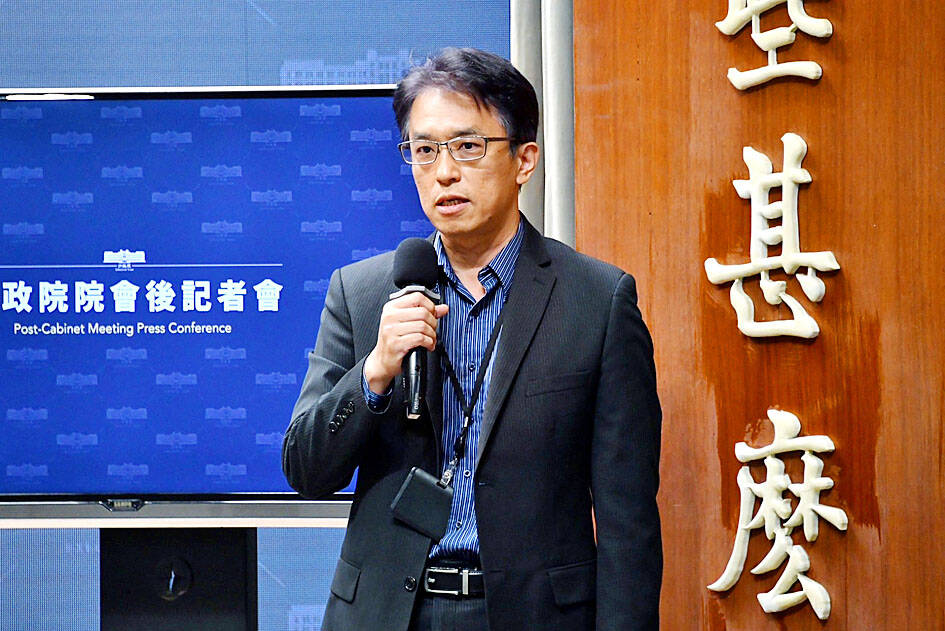The Cabinet yesterday passed a draft amendment that would allow five types of public servants to form “special associations” amid calls to allow unionization following a deadly fire last month.
The amendment would allow firefighters to form separate groups from police as current law requires.
The amendment, if passed, would allow five types of public servants — judicial officials, accountants, customs officers, police and medical personnel — to form such associations.

Photo courtesy of the Executive Yuan
According to the amendment, the associations would fall under the same law’s authority.
The Ministry of Civil Service would be responsible for reviewing and approving applications for the formation of special associations if there seems to be a discrepancy between the actual work being conducted and the professional nature of the job.
For example, firefighters and police officers both observe the Police Personnel Management Act (警察人員人事條例), even though their professions are different, Directorate-General of Personnel Administration General Planning Division Director Chou Wei-ting (周威廷) said.
The amendment also states that the formation of special agency-specific associations at Category 3 government agencies would require a minimum of 200 members, while special associations for the five types of public servants would need at least 400.
The number of people required to form special agency-specific associations under the central government and in municipalities would also be reduced from 800 to 400.
As for criticism that the threshold was too high, Chou said that public servants eligible to form special associations numbered 3,800 or above, adding that firefighters had an even higher headcount nationwide.
Chou said that the agency set a threshold to ensure that the groups would be proportionate enough to represent their vocation’s collective views while reasonably relaxing restrictions.
The amendment would allow special associations to make suggestions or attend committees, bodies or meetings, as long as the issues discussed pertain to the interest of its members.
It would also set standards on performance evaluations, and special associations could negotiate with local authorities regarding training, further education, and assistance for employee mental and physical health.
Negotiations would see certain constraints imposed, preventing the government from holding endless meetings, Chou said, adding that other measures are being introduced to ensure that the special associations could uphold the rights of their members.
Separately, Executive Yuan spokesman Lin Tzu-lun (林子倫) quoted Premier Chen Chien-jen (陳建仁) as saying that the amendment was introduced in response to labor trends and demands, and the government hoped that the introduction of special associations would maintain amity between the government and public servants.
Additional reporting by CNA

The manufacture of the remaining 28 M1A2T Abrams tanks Taiwan purchased from the US has recently been completed, and they are expected to be delivered within the next one to two months, a source said yesterday. The Ministry of National Defense is arranging cargo ships to transport the tanks to Taiwan as soon as possible, said the source, who is familiar with the matter. The estimated arrival time ranges from late this month to early next month, the source said. The 28 Abrams tanks make up the third and final batch of a total of 108 tanks, valued at about NT$40.5 billion

Two Taiwanese prosecutors were questioned by Chinese security personnel at their hotel during a trip to China’s Henan Province this month, the Mainland Affairs Council (MAC) said yesterday. The officers had personal information on the prosecutors, including “when they were assigned to their posts, their work locations and job titles,” MAC Deputy Minister and spokesman Liang Wen-chieh (梁文傑) said. On top of asking about their agencies and positions, the officers also questioned the prosecutors about the Cross-Strait Joint Crime-Fighting and Judicial Mutual Assistance Agreement, a pact that serves as the framework for Taiwan-China cooperation on combating crime and providing judicial assistance, Liang

A group from the Taiwanese Designers in Australia association yesterday represented Taiwan at the Midsumma Pride March in Melbourne. The march, held in the St. Kilda suburb, is the city’s largest LGBTQIA+ parade and the flagship event of the annual Midsumma Festival. It attracted more than 45,000 spectators who supported the 400 groups and 10,000 marchers that participated this year, the association said. Taiwanese Designers said they organized a team to march for Taiwan this year, joining politicians, government agencies, professionals and community organizations in showing support for LGBTQIA+ people and diverse communities. As the first country in Asia to legalize same-sex

MOTIVES QUESTIONED The PLA considers Xi’s policies toward Taiwan to be driven by personal considerations rather than military assessment, the Epoch Times reports Chinese President Xi Jinping’s (習近平) latest purge of the Chinese People’s Liberation Army (PLA) leadership might have been prompted by the military’s opposition to plans of invading Taiwan, the Epoch Times said. The Chinese military opposes waging war against Taiwan by a large consensus, putting it at odds with Xi’s vision, the Falun Gong-affiliated daily said in a report on Thursday, citing anonymous sources with insight into the PLA’s inner workings. The opposition is not the opinion of a few generals, but a widely shared view among the PLA cadre, the Epoch Times cited them as saying. “Chinese forces know full well that